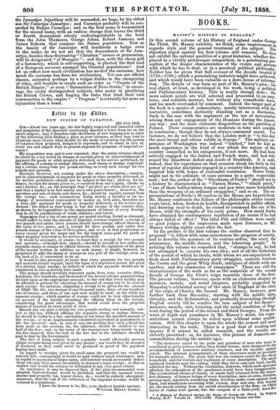Ittitr fa 14r Eititur.
NEW SYSTEM OF TAXATION.
23d July 1858. Sin—About two years ago, the late highly respected and lamented editor and proprietor of the Spectator courteously inserted a letter from me on the above subject ; may I therefore take the liberty of now begging you to allow of the following lines finding a place in your columns, as they may tend to illustrate more clearly what should be the mode of carrying out the system of taxation then proposed, designed to supersede, and to stand in lieu of, every tax and import duty at present imposed for purposes of imperial re- venue ?
My proposition was, and is now repeated, that the entire revenue should be raised by a tax levied by stamps on receipts given in acknowledgment of payment for goods or other property delivered, or for service performed, by the affixing of a stamp or stamps thereon; such stamp or stamps represent- ing a certain money-rate per pound sterling on every such receipt for two pounds and upwards.
Receipts, however, not coming under the above deseription,—namely, not in acknowledgment of payment for goods or other property delivered, or for service performed—should not be subject to the tax ; such as, for in- stance, receipts for money given to, or received from one's agent, checks on one's banker, &c., on the principal that " quefaeit per alium tacit per se," and that a banker is in fact merely one's own purse-bearer ; moreover, the purchase and sale of stocks and shares, &c., should be equally exempt from the receipt tax : such transactions being merely a transfer or an ex- change of investment represented by money on both sides, therefore not a bona fide payment for goods or property delivered, or for service per- formed : the object in view being to tax the income of the country only, shown by its expenditure in the employment of labour of every descrip- tion in all its ramifications of trade, industry, and talent. Supposing that a tax of one penny per pound sterling, levied as aforesaid, would suffice to raise the amount of imperial revenue required, a receipt of two pounds and under three pounds should have stamps affixed thereon of the value of two pence, and a receipt for three pounds and under four pounds stamps of the value of three pence, and so on in that progression on every receipt given for larger and for the largest sums paid for goods or other property delivered or for service performed. It would be necessary, of course, to enact that a receipt for two pounds and upwards,—although duly signed,--should be invalid in law unless the requisite stamp or stamps be affixed thereon, with the signature of the giver of the receipt written in addition on each stamp : it might, however, be permitted to affix the stamp or stamps on any part of the receipt, even on the back of it, if convenient to do so. It would be also necessary to enact that every payment for two pounds and upwards should require, until the lapse of a stipulated period, the proof of a written legal receipt; in default of which the payment should not be considered in law as having been made. The stamps should severally represent units, fives, tens, twenties, fifties, hundreds, five hundreds, and thousands of the money rate per pound sterling decided upon as the appropriate amount ; to the end that every facility may be afforded to persons for adjusting the amount of stamp-tax to be used on each receipt : for instance, supposing a receipt to be given for the amount of 2343/. 108. 6d., two stamps of one thousand units, three of one hundred, two of twenty, and three of one unit each might be used ; in the whole ten separate stamps ; which number of stamps could not be very objectionable on account of the trouble attending the affixing them on the receipt, considering the great advantages that would result from the proposed system of taxation in every point of view. Should any one give a receipt for two pounds sterling and upwards, sub- ject to this tax, without affixing the requisite stamp or stamps thereon, he should be liable to a fine amounting to ten times the specified amount of the receipt, or to an imprisonment considered equivalent in punishment to the fine incurred : and, in case of any one proving that such a fraud has been made on the revenue, he, the informer, should be entitled to one half of the fine ; and, in the event of the transgressor being unable to pay the fine imposed, then the half of the fine due to the informer should be paid to him by the Government. The fact of being subject to such a penalty would effectually prevent illegal receipts being ever given by any person ; nor would they be accepted if tendered, as they could never be produced in proof of the payment having been made.
In regard to receipts given for small sums the proposed tax would be scarcely felt, consequently it would be paid without much reluctance ; and, in regard to payments of larger sums, self-interest would necessarily induce those who pay their money invariably to demand a legal receipt ; so that in neither ease would the revenue be defrauded to any very great extent. In conclusion, it may be observed that, if the plan recommended were adopted, Custom-houses would be abolished, and that the assessed taxes, income and property tax, legacy duties, &c., would be entirely abrogated; moreover, that the coat of the collection of the imperial revenue would be reduced to a minimum.
I have the honour to be, Sir, your obedient humble servant,
WILLIAM BRYAN COOKE.


























 Previous page
Previous page